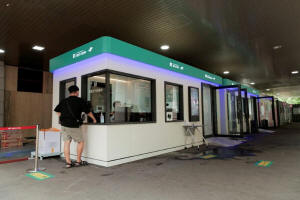|
Hallym University Sacred Heart Hospital says it has developed
the one-stop clinic to protect staff and free them from the
burden of wearing full-body protective gear in the sweltering
heat.
Patients enter rooms that seal automatically to reduce the
spread of pathogens. Nurses reach patients through windows
fitted with rubber gloves, while doctors can speak remotely
through video systems.
Previously, patients with fever or respiratory symptoms had to
wait long hours to gain access to a doctor and had to be
isolated.
"It was very difficult for people with fever or respiratory
symptoms to receive professional treatment due to COVID, and we
could solve such a problem using video chat," Hallym University
Medical Center director Lee Me-yeon said. "It was hard to see
and hear patients clearly in full protective gear."
A minimum number of nurses like Joung Eun-sol, 23, are needed on
site for basic COVID-19 testing or temperature checks and they
no longer need to put on Level D protection gear - gloves,
safety glasses, face shield and chemical-resistant boots.
"The worst was withstanding the heat, but it was also hard to
communicate with patients or breathe in Level D," Joung told
Reuters on Thursday, wearing a short-sleeved uniform and a face
mask. "I can now use the restroom and even eat... I don't need
to walk around all the time, but be seated as I work."
Hallym University Sacred Heart Hospital Director Yu Kyung-ho
said: "The technology could possibly serve as a very useful
medical treatment system in countries where doctors and medical
resources are scarce."
(Reporting by Daewoung Kim, Yeni Seo; Writing by Sangmi Cha;
Editing by Janet Lawrence)
[© 2021 Thomson Reuters. All rights
reserved.] Copyright 2021 Reuters. All rights reserved. This material may not be published,
broadcast, rewritten or redistributed.
Thompson Reuters is solely responsible for this content.

|
|




